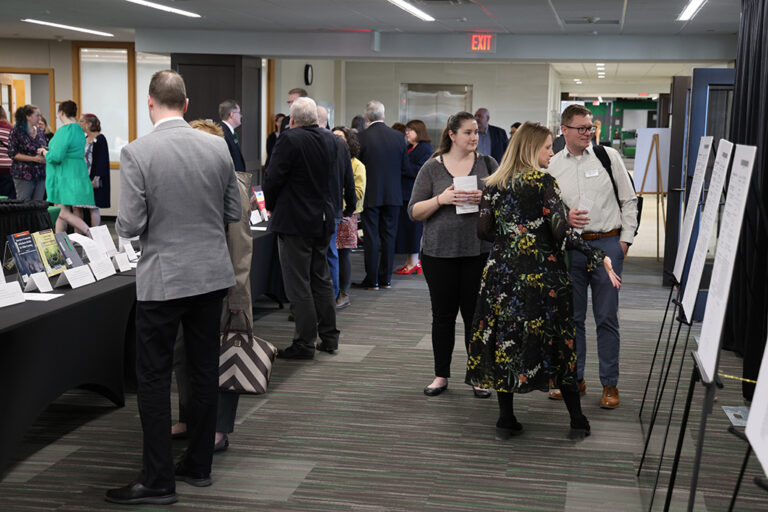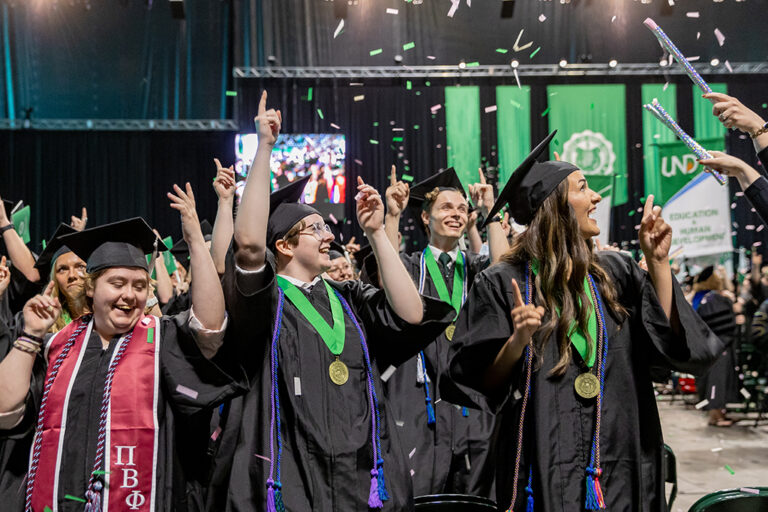Admired UND library worker moonlighted as respected film scholar
Randy Rasmussen Memorial Lecture Series honors a true patron of the arts

The epitaph on Randy Rasmussen’s tombstone at Union Cemetery in his hometown of Towner, N.D., reads: “Author, Gentleman, Patron of the Arts.”
Nobody acquainted with the former UND employee and graduate – who died of leukemia in December 2020 at the age of 67 – would disagree with this description of him.

It exemplifies why the Randy Rasmussen Memorial Lecture Series was launched last month by the Chester Fritz Library. Rasmussen was employed at CFL for 21 years, during which he worked in the periodicals section and served as the library’s book repair specialist.
“He was someone who you could ask to do anything, and he would gladly do it, never asking a question about why,’ said Sally Dockter, UND’s interim dean of libraries. “He was always there to help.”
Curt Hanson, head of CFL special collections, remembered Rasmussen as a colleague with whom he could joke, discuss movies and commiserate with about Minnesota Vikings, their favorite football team.
“Everybody loved Randy,” Hanson said. “He was just the most wonderful person you could ever hope to meet.”
Humble,quiet, polite
Rasmussen’s colleagues knew him as a quiet, humble, private and polite person who was very active in the arts community at the University and throughout Grand Forks. They also knew he was an avid fan of classic movies who wrote books on the subject.
Karlene Clark, a reference services librarian at CFL, worked with Rasmussen and was a member of a small circle of friends who regularly watched movies at his residence.
“He was really interested in the arts,” she recalled. “It was his big thing – not just the writing and the movies. He attended orchestra events, choir events, community events and events at the Empire and Burtness theaters. He donated to all of them.”

Clark noted that when Rasmussen was undergoing treatment for his illness at Altru Hospital, a group of UND musicians went there to perform for him.
Rasmussen’s sister, Terri Mickelson of Ames, Iowa, was 7 ½ year older than her brother. “I didn’t realize what a gem I had for a brother until I was an adult,” she said.
She recalled that from an early age, he was curious and had a wide range of interests.
“Even though he was a vegetarian and a conscientious objector, he was fascinated with war,” she said. “He studied and read many books on the subject, and I got to be his student when I visited him. He was very interested in ships – especially battleships.”
Rasmussen was also interested in weather throughout his life. Mickelson said once when he was in high school, her brother stood in for Towner’s weather person when she went on vacation for a week. Mickelson said her brother was also into sports, a fan of UND athletics and an avid golfer and tennis player.
A surprising discovery
However, the depth of Rasmussen’s passion and the breadth of his knowledge weren’t truly revealed until after he lost the second round of his battle with leukemia. His CFL colleagues helped him through his final days of hospice, tending to his needs in the condominium where he lived alone.
After Rasmussen died, they helped Mickelson begin the process of sorting through his belongings. And that’s when they began to understand that Rasmussen’s home wasn’t simply the place where he lived. It was also where he kept a curated collection dedicated to what he loved.
The condominium contained thousands of movie DVDs, music CDs, books, models, movie memorabilia and correspondence, all meticulously stored, recorded and cataloged in handwritten notebooks – not surprising given Rasmussen’s inherent distrust of computers and the internet. There were also 49 battleship models he intended to build after he retired.

Hanson made an important discovery about someone he thought he knew well after the 20 years they’d worked together.
“It wasn’t until I was processing his archival collection that I realized how in demand he was as a film scholar,” Hanson explained. “He wasn’t just some guy from Grand Forks, North Dakota, writing about movies. He was sought after by these publishers who wanted him to write books.”
Clark was intrigued by a box of letters found among Rasmussen’s belongings.
“The communications he had weren’t only with the publishing industry, but also with movie directors,” she said. “He had letters of back-and-forth discussions with directors about things they needed to consider, such as sequels.”
And then Rasmussen’s friends understood why, when they watched a movie with him and listened to his commentary, it changed their perception of movies.
Classic cinema expertise

“If you watched a movie with him or read one of his books, you couldn’t watch a movie the same way again,” Clark said. “He had a way of describing and thinking – ways you’d never thought about.”
Before he died, Rasmussen donated his entire collection to UND’s library. The movie DVDs and music CDs can now be checked out by CFL’s patrons.His collection of movie posters and other memorabilia is housed in the library. His writings, drafts, correspondence and photos are in the Department of Special Collections archives. His battleship models were distributed to veterans’ homes throughout North Dakota.
Dockter called Rasmussen’s movie collection “an archival collection of cinema.” Brian Garrison, a business and government documents librarian who helped organize the Randy Rasmussen Memorial Lecture Series, said, “The first thing I noticed was that he really enjoyed classic cinema. He had excellent taste and an excellent collection.”
Creating a lecture series centered on the arts and literature was not only a way to bring back library events that ended during the COVID pandemic, but also a way to remember Rasmussen for his commitment to the library, his passion for the arts and his contributions as a valued and beloved colleague.
“Randy was so humble that he would be embarrassed about the attention and the lecture series,” Clark said. “But privately, he’d like it.”
Garrison, who started working at CFL after Rasmussen passed away, understands how much he was loved, admired and respected at UND and within the community
“It’s made me think there’s a great deal of responsibility in having this lecture series to remember him properly and honoring him as someone everybody loved,” he said.

Honoring a patron of the arts
Mickelson appreciates all the CFL staff has done for her brother and their efforts to honor his memory.
“The lecture series is spot on,” she said. “Randy was sincere about his love and promotion of the arts, and although he was shy about memorializing it, he would have accepted it. I think his CFL colleagues know this.”
The inaugural Randy Rasmussen Memorial Lecture was held on Jan. 26 at CFL About 50 people gathered to hear Brian Urlacher, professor of political science and public administration, read selections from his debut novel, “The Library of Chester Fritz,” published by the UND Digital Press.
Following the reading, William Caraher, associate professor of history, and Patrick Henry, assistant professor of English, discussed scholarly and literary publishing in a changing landscape.
The next lecture in the series on April 13 will feature author and editor Eric Link, UND’s provost and vice president for academic affairs, who will discuss the field of science fiction film and literature. He will cover the impact of contemporary techno-philosophical ideas, such as artificial intelligence, virtual reality, and the technological singularity hypothesis on modern science fiction.



